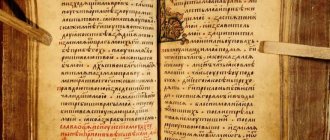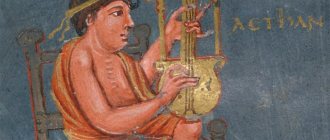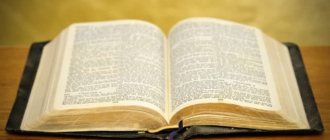The name of King David is mentioned frequently in the Bible, which is not surprising considering that this man is one of the greatest God-glorifying figures who played an important role in the spread of Christianity. The prophet was blessed with the opportunity to reign over the people of Israel, the years of his reign fell on ancient times, the anointed of the Lord lived 3000 years before the birth of Christ. David became famous for his unshakable faith and many merits before God, for which he was rewarded by the Almighty, but sometimes he also suffered punishment for his mistakes and sins.
Text of Psalm 29
To perform David's work in the temple, the clergy take the text in Church Slavonic, which even some ordinary believers understand. For the rest, the unprepared, it is recommended to read the Russian translation of the song of praise for a personal appeal to the Lord.
In Church Slavonic
In Russian
Psalm 121 text
| 1 We rejoiced because they said to me, “Let us go to the house of the Lord.” | 1 I rejoiced at those who said to me, “We will go to the house of the Lord.” |
| 2 Our feet are standing in your courts, Jerusalem. | 2 Our feet have stood in your courts, O Jerusalem. |
| 3 Jerusalem was built like a city, and its communion is together. | 3 Jerusalem, built as a city, whose community is in its unity. |
| 4 For there the tribes went up, even the tribes of the Lord, the testimony of Israel, to confess to the name of the Lord, | 4 For the tribes went up there, even the tribes of the Lord, as a testimony to Israel, to glorify the name of the Lord, |
| 5 Because there the thrones sat in judgment, the thrones were in the house of David. | 5 For there are thrones set up for judgment, thrones in the house of David. |
| 6 Ask now about the peace of Jerusalem: and abundance for those who love you. | 6 Ask therefore that which will bring peace to Jerusalem; and abundance - to those who love you; |
| 7 May there be peace in your strength and abundance in your pillars. | 7 May there be peace in your strength, and abundance in the towers of your strongholds. |
| 8 For the sake of my brothers and my neighbors, peace be upon you. | 8 For the sake of my brothers and my neighbors, I spoke “peace” about you; |
| 9 To the house for the sake of the Lord our God I will seek what is good for you. | 9 For the sake of the house of the Lord our God, I have sought good things for you. |
We rejoiced because they said to me: Let us go to the house of the Lord. Our feet are standing in Your courts, Jerusalem. Jerusalem was built like a city, and its communion is together.
For the sake of my brothers and my neighbors, peace be upon you. To the house for the sake of the Lord our God I seek good things for you.
https://youtube.com/watch?v=TxPHVCosStY
In the Hebrew, Latin and Orthodox Bibles, the text of Psalm 121, like several previous ones, is called the song of ascension.
This means that it was sung by the Levites during the solemn ascent to the Jerusalem temple, which took place during major religious holidays.
The second verse of the psalm speaks about this: “Behold, our feet stand in your gates, Jerusalem” (Ps. 121:2) - it expresses the joy of a person returning to his hometown after a long life in a foreign land. The interpretation of Psalm 121 indicates that its author is David, under whom the restoration of the second temple and the transfer of the Icon took place.
In what cases is it customary to read Christian Psalm 121?
The author of the text of Psalm 121 describes in it the beauty of Jerusalem: in his words one can feel the love of a man who has repeatedly had to be an exile and live far from his hometown.
The psalmist sees in this city the stronghold of the strength of his people, and therefore begs God to bless and preserve it for the sake of those living in it.
In the Orthodox tradition, reading and listening online to the text of Psalm 121 is customary in order to protect oneself from the evil eye.
Read the Orthodox text of the prayer Psalm 121 in Russian
Song of Ascension. David.
There are thrones of judgment, thrones of the house of David.
Ask for peace for Jerusalem: may those who love you prosper! May there be peace within your walls, prosperity within your palaces! For the sake of my brothers and my neighbors I say: “Peace be with you!” For the sake of the house of the Lord our God, I wish you well.
Psalter, text of Psalm 121 in Church Slavonic
We rejoice in those who spoke to me; Let's go to the house of the Lord. Our feet are standing in your courts, Jerusalem. Jerusalem is built like a city, and its communion is part of it.
There, the tribes went up, the tribes of the Lord, the testimony of Israel, to confess the name of the Lord; for when the thrones sat down for judgment, the thrones were in the house of David. Ask about the peace of Jerusalem; and abundance to those who love you. May there be peace in your strength, and abundance in your pillars.
For the sake of my brothers and my neighbors, peace be upon you. To the house for the sake of the Lord our God I seek good things for you.
- Song of Ascension. David.
- I rejoiced when they said to me: “Let us go to the house of the Lord.”
- Behold, our feet stand at your gates, O Jerusalem,
- Jerusalem, built as a city merged into one,
- where the tribes go up, the tribes of the Lord, according to the law of Israel, to give thanks to the name of the Lord.
- There are thrones of judgment, thrones of the house of David.
- Ask for peace for Jerusalem: may those who love you prosper!
- May there be peace within your walls, prosperity within your palaces!
- For the sake of my brothers and my neighbors I say: “Peace be with you!”
- For the sake of the house of the Lord our God, I wish you well.
Psalm 121 about healing from the evil eye
In the Religion, Faith section, to the question: Please help me find the text of Psalm 121 “On the healing of people suffering from the evil eye”! asked by the author Ta_Nusha the best answer is Psalm 1211 Song of Ascension. David.
5 There are thrones of judgment, the thrones of the house of David.
6 Ask for peace for Jerusalem: may those who love you prosper! 7 May there be peace within your walls, prosperity within your palaces! 8 For the sake of my brothers and my neighbors I say: “Peace be with you!” 9 For the sake of the house of the Lord our God, I wish you well.
History of writing
David ascended the throne by the will of the Lord; at that time he was a simple shepherd. Before the beginning of his reign in Israel, the prophet went through many trials, through which he won not only power, but also the favor of the Jewish people. People quickly got used to the new ruler and fell in love with him.
More and more subjects, faithful servants appeared next to David, which could not but please him. This joy made him temporarily forget about the help of the Almighty. The king dared to suggest that he achieved everything in life on his own.
Only a terrible misfortune, which is described in the text of Psalm 29, succeeded in bringing him to his senses. It talks about a pestilence that has been thinning out the civilian population for years. Observing this, the prophet realized that he was wrong. He atone for his sin before the Lord, hoping that He would stop punishing the people for their mistakes.
He asked the One Creator to protect the lives of Jews, to save them from a terrible illness. He wanted a trial only for himself, but the plague did not affect his home or family members. The work additionally places emphasis on praising God, his deeds, mercy, and gifts sent to humanity. In difficult times, David did not dispense with writing one prayer; using it, he consecrated the altar, where the temple was built in the future.
Links[edit]
- ↑
Quote from Charles Augustus Briggs;
Emily Grace Briggs (1960) [1906]. A critical and exegetical commentary on the book of psalms. International critical commentary. 1
. Edinburgh: T&T Clark. paragraph 251. - For the quote, see Charles Augustus Briggs; Emily Grace Briggs (1960) [1906]. A critical and exegetical commentary on the book of psalms. International critical commentary. 1
. Edinburgh: T&T Clark. paragraph 252. - ↑
For the date of Nehemiah, see James D. J. Dunn (November 19, 2003). Erdman's Bible Commentary. Wm. B. Eerdmans Publishing. item 321. ISBN. 978-0-8028-3711-0. - On the end of the Persian period, see Mark J. Boda; J. Gordon McConville (June 14, 2013). Dictionary of the Old Testament: The Prophets. InterVarsity Press. p. 415. ISBN 978-0-8308-9583-0.
- "Teillim - Psalms - Chapter 29". Chabad.org. 2022. Retrieved September 24, 2022.
- The Complete Artscroll Siddur, page 314
- Complete Artscroll Siddur page 458
- Complete Artscroll Siddur page 592
- ^ ab The Artscroll Tehillim page 329
- Complete Artscroll Siddur page 479
- Complete Artscroll Siddur page 195
- Complete Artscroll Siddur page 607
- Complete Artscroll Siddur page 759
When and how do you read Psalm 29?
It is unacceptable to forget about the Lord even in moments of great joy. At such moments, the righteous are supposed to thank the Almighty for his support, which Psalm 29 helps with. This song of praise is popular as a ritual song used by priests; it is also indispensable for turning to God at home.
The prayer is read to:
- receive protection from the One Creator in a dangerous situation;
- get well (they ask for themselves and for loved ones);
- to be renewed and cleansed spiritually.
Reading an ancient text once is not enough to achieve such an effect. It is recommended to pray regularly and diligently. They turn to the Almighty with Psalm 29 not only in churches, but also at home near the holy face.
[NEW VIDEO]Prayer for punishing offenders and enemies. Psalm 108 - Retribution for Enemies
Reasons why a person may be under the influence of evil forces: 1st reason - if you were envied 2nd reason - if they cast a spell against you 3rd reason - if you have not been able to forgive someone for a long time 4th reason - if a family curse has passed into your family, which passed on from generation to generation.
Any manifestations of the following symptoms: - insomnia - fear - nervousness - aggressiveness - constant headaches - fainting - visual and auditory hallucinations - obsessive thoughts of suicide/murder.
- addictions (drugs, alcohol, cigarettes) - anxiety - unexplained frequent illnesses - often tormented by depression - incurable diseases - seizures - epileptic seizures - signs of mental illness - anxiety when someone is reading prayers - anxiety when performing religious rituals - intolerance to water, especially saint.
— detection of abilities for levitation, telekinesis, teleportation. How to get rid of this influence? To get rid of the influence of evil forces you need: First: Realize that just as darkness is driven out only by light, so evil forces and demons are driven out only by prayer with authority in the name of Jesus Christ.
Second: Take part in the ministry for liberation! Third: Change your lifestyle! And this is a real war, but this is the only way to get rid of the influence of evil in your life! And your life will change! If you notice at least one of these symptoms, then we advise you to make a serious decision to get rid of it. If you feel that you cannot cope on your own, then seek help. Liberation is the path to freedom in life!
Prayer to the Life-Giving Cross of the Lord
In Thee, O Lord, have I trusted, that I may never be ashamed: by Thy righteousness deliver me and save me. Incline Your ear to me, hasten to take me away, make me a Protector God and a house of refuge to save me. For Thou art my power and my refuge, and for Thy name’s sake instruct me and nourish me.
Deliver me from this net, even though you have hidden it from me, for You are my Protector, O Lord. In Thy hand I will offer my spirit: Thou hast delivered me, O Lord God of truth. You have hated those who keep vanities in vain: but I trusted in the Lord.
I will rejoice and rejoice in Your mercy, for You have looked upon my humility, You have saved my soul from need, and You have shut me up in the hands of the enemy, You have placed me on my vast nose. Have mercy on me, Lord, as I grieve: my eye, my soul and my womb are troubled by rage.
I was forgotten as if I were dead from the heart, I was like a vessel destroyed, as if I heard the evil of many living around, when they gathered together against me and took my soul together. But I trusted in You, O Lord, and said: You are my God. My lots are in Your hand: deliver me from the hand of my enemies and from those who persecute me. Make Thy face shine upon Thy servant, save me by Thy mercy.
Lord, let me not be ashamed, for I called Thee: let the wicked be ashamed and go down to hell. Let flattering lips be mute, speaking against the righteous with iniquity, pride and humiliation. Since You have hidden the great abundance of Your goodness, O Lord, from those who fear You, You have made them trust in You before the sons of men.
Having hidden them in the secret of Your face from the rebellion of man, You have covered them with shelter from the wrangling of tongues. Blessed is the Lord, for He has astonished His mercy in the city of enclosure. I said in my frenzy: I am rejected from the presence of Your eyes: for this reason You heard the voice of my prayer, when I cried out to You. Love the Lord, all who reverence Him, for the Lord seeks truth and rewards those who are excessively proud. Take courage, and let your heart be strong, all you who trust in the Lord.
Among the so-called “Psalms of David” is Psalm 108, which was intended by the church to curse Judas for his betrayal of God. In the Orthodox Church, it was previously used to impose a church curse on people who have committed serious crimes and whom justice cannot reach (where the law does not reach, God's retribution will reach).
If there are several enemies, then one person - one reading for him. These are not “weapons of mass destruction.” How many days should you read? Until the effect. Not a literal effect, following the example of the text: “let his children wander and beg and ask for bread from their ruins,” but stable signs of PUNISHMENT as such.
A mandatory exception is not to read on Sundays and church holidays. God himself will determine how to punish the enemy who went against people, against the commandments of God. You don't curse, you PRAY! The text says: “And I pray.” Everything is already stated in the Psalm. You don't need anything more than what is said there. God himself will measure his punishment, and be grateful for it.
Interpretation
The song of praise was written by David after the Lord had mercy on the people, saving them from a difficult trial. The whole essence of Psalm 29 can be revealed by the interpretation of individual verses of the work:
- Verses 1 – The king thanks God for his help, promising Him to glorify His name.
- Verses 2 and 3 – David continues to develop the theme raised at the beginning of the psalm. He is grateful to the Almighty for saving the lives of the Jewish people, the author discusses the misfortunes that befell the inhabitants of Israel.
- Verse 4 – The prophet encourages the reader to praise God.
- Verse 5 to 9 – The author repents of his sins, considers the troubles that the Jews faced as punishment from God for the mistakes he made. The emphasis is on the peace that the One Creator gives to the righteous, on His mercy, which erases all adversity.
- Verses 10 to 12 - glorification of the Lord, joy at the given grace, salvation from a terrible illness. David promises God to serve him until the end of his days.
Uses [edit]
Judaism[edit]
- Sixth paragraph of Kabbalat Shabbat. [6]
- It is read on Shabbat during Shacharit, as when returning the Torah Scroll to the ark. [7]
- In some congregations it is read before Maariv on Motzei Shabbat. [8]
- In some traditions it is recited on the third day of Sukkot. [9]
- In some traditions it is recited on Shavuot. [9]
- Verse 11 is part of Talmud Berachos 64a. [10] This is the final verse of Birkat Hamazon, [11] recited during prayers after Motzei Shabbat Maariv, [12] and recited at the opening of Hakafot on Simchat Torah. [13]
Interpretation and prophetic meaning
The Psalter is not only a collection of powerful prayers. Many psalms carry prophetic meaning, and the song of vengeance is no exception:
- After a terrible betrayal, Judas was exposed and deprived of the rank of bishop.
- When the Jews rebelled against the Romans, the Romans laid siege, which led to famine. Entering the city, the opponents killed all the men, leaving their wives and children to die of starvation.
- Those who were able to survive this bloodbath fled from Israeli lands. Without a penny to their name, they were forced to beg, wandering through neighboring countries.
- Having emerged victorious, the Romans imposed a huge tribute on the Jews, thereby depriving them of their last property.
- The historical event that drove the Jews from their lands took place over the course of one generation. The descendants of the survivors no longer found Jerusalem and its temple.
- The sin of idolatry during 40 years of wandering in the desert, as well as the crucifixion of Christ, led to the fact that the ancient Jewish people were completely wiped out from the face of the earth.
For several centuries, theologians have tried to explain the deep meaning of the song of vengeance. The meaning of the sacred text is that all troubles occur through the fault of the person himself, who deliberately commits evil against other people. The severity of the punishment and its duration depend on the severity of the crime and on the extent to which the sinner rejects God.




